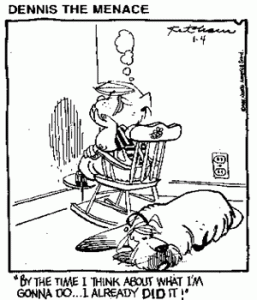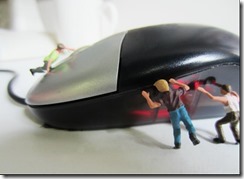
When trying to understand disinhibition after brain injury, think about times you might have acted without thinking.
Experiences you might have had when you have said, or done something suddenly, without thinking. Then immediately wished you could take it back.
People who know me well, would say I do it all the time!
This is a simple demonstration of what “disinhibition” after brain injury is like. Usually we have a grown up voice in our head that tells us when not to do, or say something. When a person is disinhibited this voice is missing, or much quieter. There is no filter.
Everyday words people might use to describe what they see might include: tactless, exhibitionist, show no shame, blunt, rude and impolite, too honest, short fused. But it is part of the damage to the brain.
On the other side:
It can be quite refreshing to meet someone who says, and does things as they feel, someone who calls it as they see it.
Sometimes though, it can be distressing – for family and friends, for people who do not understand what is happening, or when the words or actions are harmful.
What Causes Disinhibition after Brain Injury
Disinhibition can happen in a range of situations not related to brain injury, including drinking alcohol.
Disinhibition after brain injury is directly related to damage to the part of the brain that monitors our behavior and responses. It is not deliberate, it is the Brain Injury talking. It can happen whatever the cause of brain injury – stroke, fronto-temporal dementia, traumatic brain injury, tumour, Motor Neurone disease. .
Well any type of brain injury really. It is most often associated with damage to the frontal lobe.
What can happen
Here are some of the ways disinhibition after brain injury might present itself:
- Saying things to others that would normally be kept private. Telling a shop assistant “I had great sex last night”
- Blurting out whatever comes to mind without self censoring first.
- Not keeping confidences. “Mum said not to tell you but she thinks you are too bossy”
- Making comments that are hurtful to others “You look fat in that dress”
- Not following social / cultural rules. Not following your own, well known religious or cultural practices.
- Being disinhibited sexually. Making sexual comments to strangers, touching other people inappropriately.
- Not being able to hide or modify responses, which can appear insensitive, or rude. Yawning loudly and saying “Will this ever end” when in a lecture.
- Respond abusively or aggressively to others because the filter to stop excessive responses (over reaction) is not in place. The anger seems out of proportion to the event that triggers it.
- Not being able to control urges as well. Eating excessively, or not monitoring amount when drinking alcohol.
Please share any comments or other examples in the comments at the end of this post or you can contact me directly
And Finally:
Here are some resources on disinhition you might find useful in getting to understand how it is for a person with brain injury and their family. Below are links to first hand stories of people living with disinhibition after brain injury.
Firstly Cheryl Gansner. Cheryl has been writing a blog about their own experience after her husband, Bryan, was severely injured in Iraq .
I recommend also reading the comments that have been written below Cheryl’s post on disinhibition after brain injury. They also provide real life stories of living with changes after brain injury:
[box style=”rounded” border=”full”]Wife of a Wounded Soldier – Disinhibition[/box]
I encourage you to read more about the life and history of Cheryl and Bryan Gansner, and other first person stories that truly help to understand the impact of brain injury. You can find a link to their website HERE.
A second story can be found in Cheryl Green’s blog post Disinhibition and Meeting People After Brain Injury, Cheryl Green writes from her own firsthand experience after a traumatic brain injury:
[box style=”rounded” border=”full”]Brain Injury Blog and Disinhibition[/box]
Next week I will share some tools and strategies for managing disinhibition. Meanwhile please share your own experiences, stories, and comments below.

Pingback: WHAT DO KING HENRY VIII BRAIN INJURY AND BEHAVIOUR CHANGE HAVE IN COMMON? - Changed Lives, New Journeys
Pingback: A Pink Bunny, Creativity and Brain Injury - Changed Lives, New Journeys
Pingback: Disinhibition after Brain Injury - Tips and Strategies - Changed Lives New Journeys